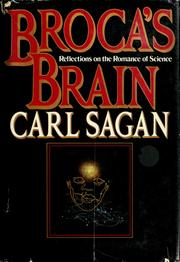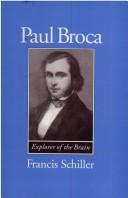| Listing 1 - 9 of 9 |
Sort by
|

ISBN: 0394501691 Year: 1979 Publisher: New York, N.Y. Random House
Abstract | Keywords | Export | Availability | Bookmark
 Loading...
Loading...Choose an application
- Reference Manager
- EndNote
- RefWorks (Direct export to RefWorks)
Multi
ISBN: 9076864624 Year: 2004 Volume: 95 Publisher: Utrecht LOT
Abstract | Keywords | Export | Availability | Bookmark
 Loading...
Loading...Choose an application
- Reference Manager
- EndNote
- RefWorks (Direct export to RefWorks)
Psycholinguistics --- Broca, Paul --- Theses
Book
ISBN: 9780195177640 Year: 2006 Publisher: Oxford Oxford University Press
Abstract | Keywords | Export | Availability | Bookmark
 Loading...
Loading...Choose an application
- Reference Manager
- EndNote
- RefWorks (Direct export to RefWorks)
Semiotics --- Psycholinguistics --- Broca, Paul
Book
ISBN: 1597566047 9781597566049 9781597564786 1597564788 Year: 2013 Publisher: San Diego Plural Pub.
Abstract | Keywords | Export | Availability | Bookmark
 Loading...
Loading...Choose an application
- Reference Manager
- EndNote
- RefWorks (Direct export to RefWorks)
Undergraduate and graduate students as well as practicing professionals and clinicians in psychology, neurolinguistics, cognitive psychology, communication science and disorders, neurology, neurosurgery, neuropsychiatry, nursing and health-related professions, and philosophy of science will be interested in this book. It both honors the life and work of Pierre-Paul Broca, and in doing so, also honors the many French brains that paved the way for the development of the neurosciences.
Book
ISBN: 9789078328605 9078328606 Year: 2008 Publisher: Utrecht LOT
Abstract | Keywords | Export | Availability | Bookmark
 Loading...
Loading...Choose an application
- Reference Manager
- EndNote
- RefWorks (Direct export to RefWorks)
Orthopedagogics --- Grammar --- Psycholinguistics --- Aphasia. --- Minimalist theory (Linguistics). --- Broca, Paul,
Book
ISBN: 2738100864 9782738100863 Year: 1990 Publisher: Paris: Éditions Odile Jacob,
Abstract | Keywords | Export | Availability | Bookmark
 Loading...
Loading...Choose an application
- Reference Manager
- EndNote
- RefWorks (Direct export to RefWorks)
Physicians --- Médecins --- Biography --- Biographie --- Broca, Paul, --- Anatomy --- Anthropology --- General Surgery --- Médecins --- Anatomists --- France --- Anthropologists --- Surgeons --- Anatomy - France - biography --- Anthropology - France - biography --- General Surgery - France - biography --- Broca, Paul

ISBN: 0195074963 Year: 1992 Publisher: New York Oxford Oxford University Press
Abstract | Keywords | Export | Availability | Bookmark
 Loading...
Loading...Choose an application
- Reference Manager
- EndNote
- RefWorks (Direct export to RefWorks)
Anatomists --- France --- Biography --- Anthropologists --- Surgeons --- Broca, Paul, 1824-1880. --- Anatomists - France - Biography. --- Anthropologists - France - Biography. --- Surgeons - France - Biography.
Book
ISBN: 9782296105119 Year: 2009 Publisher: Paris Harmattan
Abstract | Keywords | Export | Availability | Bookmark
 Loading...
Loading...Choose an application
- Reference Manager
- EndNote
- RefWorks (Direct export to RefWorks)
La Société d'anthropologie de Paris a été fondée à la fin de l'année 1858 par le médecin Paul Broca pour promouvoir, selon ses statuts, " l'étude scientifique des races humaines ". Elle connut un succès rapide et durable. La préhistoire naissante et les audacieuses hypothèses de l'Origine des espèces de Charles Darwin s'associaient dans l'esprit savant à la lourde discipline de l'anthropométrie. Le temps de la terre et le temps des hommes se voyaient réconciliés, avec cette conséquence inattendue, vite enregistrée, que l'homme n'est ni de " création " récente ni isolé dans la chaîne des êtres vivants. Dès les années 1860, les anthropologues discutaient des crânes et du peuplement européen, de l'homme des cavernes et du gorille, de Boucher de Perthes et des progrès de la civilisation. Et l'on doutait peu qu'enfin l'homme se connût lui-même dans sa " nature ", ses origines et la disparité tant physique qu'intellectuelle de ses " races ". Par ses enjeux de connaissance, l'anthropologie semblait braver les interdits des autorités religieuses et morales traditionnelles. Cette science d'ouverture s'offrit alors d'elle-même au jeu des querelles méthodologiques, doctrinales et philosophiques. Paul Broca rallia à son programme nombre de savants libres penseurs ou positivistes mais également gobiniens, phrénologues et spiritualistes qui tous communiaient dans un même questionnement en divergeant radicalement sur les points en litige. Le premier demi-siècle de la Société d'anthropologie fut celui des affrontements, des préjugés et du choc des traditions culturelles. Ces épisodes de controverse, récurrents ou ponctuels, scandent la vie mouvementée de l'anthropologie française des années 1850-1900. Ils sont ici analysés dans leur complexité et leur devenir, tels qu'ils ont configuré les imaginaires de l'humain, de la statique à la dynamique, de la race à l'évolution des sociétés.
Physical anthropologists --- Physical anthropology --- Anthropologists --- Biological anthropology --- Somatology --- Anthropology --- Human biology --- History --- Broca, Paul, --- Broca, Pierre Paul, --- History of french anthropology - 19th century. --- Broca, paul (1824-1880 ) --- Anthropologie physique --- Société d'anthropologie de paris --- Critique et interprétation --- France --- Histoire
Book
ISBN: 0773551654 9780773551657 9780773551664 0773551662 9780773551329 0773551328 Year: 2017 Publisher: Montreal Kingston London Chicago
Abstract | Keywords | Export | Availability | Bookmark
 Loading...
Loading...Choose an application
- Reference Manager
- EndNote
- RefWorks (Direct export to RefWorks)
Paul Broca made the most significant discovery in nineteenth-century human biology when he found that speech resides within the left frontal lobe of the human brain. As a young surgeon working at the hospice at Bicêtre on the outskirts of Paris – a repository for the criminal, the insane, the indigent, and the sick – Broca had to overcome derision, acrimony, personal attacks, vindictiveness, and prevailing doctrines before his findings were accepted. Based on a new reading and translation of original records by Broca, Jean-Baptiste Bouillaud, and Gustave Dax, Fearful Asymmetry recounts the story of this hard-won scientific discovery. Richard Leblanc describes the contentious process, beginning with Bouillaud, who laid the groundwork for the findings, that led Broca on the trail of discovery as he struggled to bring forward a fundamental truth of neurology and, ultimately, of the human condition. Finally, Leblanc connects the research of the three French scientists to the work of Wilder Penfield at the Montreal Neurological Institute in the twentieth century, when neurology moved beyond postmortem anatomical studies to direct observations of the conscious brain. Making many of the debates about localization available for the first time in English, Fearful Asymmetry provides a detailed account of one critical scientific success and the long history behind it.
Broca, Paul, --- Bouillaud, J. --- Dax, Marc, --- Bouillaud, Jean Baptiste, --- Bouillaud, --- Broca, Pierre Paul, --- Brain --- Brain. --- Language and languages --- Language and languages. --- MEDICAL / History. --- Foreign languages --- Languages --- Anthropology --- Communication --- Ethnology --- Information theory --- Meaning (Psychology) --- Philology --- Linguistics --- Cerebrum --- Mind --- Central nervous system --- Head --- Localization of functions --- Research --- History --- Physiological aspects
| Listing 1 - 9 of 9 |
Sort by
|

 Search
Search Feedback
Feedback About UniCat
About UniCat  Help
Help News
News